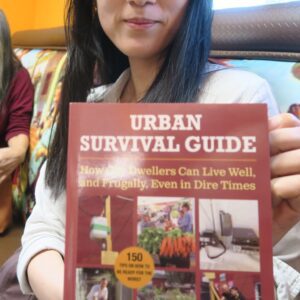Description
TESTING YOUR OUTDOOR SURVIVAL SKILLS by Christopher Nyerges
Designed as the textbook that Nyerges uses in the classroom, the book is also designed so you can test and improve your own skills and knowledge. Chapters on identifying plants, primitive fire-making, food in the wild, navigation by sun and stars, water (finding, purifying, storing), clothing, first aid, weapons (primitive and modern), and more. This textbook became the foundation for How to Survive Anywhere.
8 ½ x 11 format, comb-bound, fully illustrated.
TABLE OF CONTENTS
Test Your Knowledge of Plants
Test Your Knowledge of Mushrooms.
Test Your Fire Skills
Water in the Wilderness
Shelter Skills
Test Your Clothing Survival Quotient
Test Your Orienteering Skills
Cold Water Survival
Emergency First Aid
Some Wilderness Hazards
Tools and Weapons
Contents of a “Get Home” bag
Final Quiz
Every Quiz is followed by the Answers to the questions, with a lots of charts, illustrations, and supplemental articles.

WHY I WROTE MY BOOKS
“Testing Your Outdoor Survival Skills”
I am often asked why I teach and write about the topics of self-reliance and survival. Here is part of my answer.
“The city” developed organically from the earliest times of human history, presumably for the mutual survival and upliftment of all those who became a part of it. The city became the locus for heightened social interaction, where farmers could barter and sell their goods to the far reaches of the domain, where the brightest and the best could answer your questions and resolved your needs, whether about technical, medical, or other issue. It’s obvious why cities developed, though it has not always so altruistic.
We know, for example, that the great Mayan cities most likely had theocratic rulers whose orders were law, and sometimes that worked out well for the people. But it could also spell the demise for the city if deluded self-important religious leaders saw themselves as more important than “the people.” Right here in North America, there was the great city of Cahokia in what is now Illinois, which emerged, dominated, changed and improved the lives of everyone it touched, and then, for various reasons, it disappeared.
Cities and civilizations arise out of the common interests of those it serves, and they seem to follow a pattern of growth, peaking, declining, disappearing (that’s the 25 cent version of what usually takes a full semester anthropology course).
Sometimes we can feel like we are just a drop of water in the ocean, but as we network and work with like-minded others, we can move in the direction of living solutions.
When I began teaching about wild foods and survival skills when I was still a teenager, I did so because I saw “civilization” as a fragile thing, and I felt that basic survival skills would never go out of style. So I wrote and taught to encourage others to think likewise, but mostly I did so to clarify my own thinking on the subject. You could call it enlightened self-interest. Plus, by teaching and writing, I was able to meet others along the same path, people that I would have never met if I were hiding out somewhere in a cave.
I taught field trips, and I taught in the classroom. When I taught in the classroom, I found it useful to organize each subject by topic, and to teach by constantly asking questions of the students. Those refined and edited questions became the basis for my “Testing Your Outdoor Survival Skills” textbook, which I have continually edited and refined over the years.
Though I still use that “Testing” textbook, I also wrote “How to Survive Anywhere,” which embodies most of the ideas in “Testing Your Outdoor Survival Skills,” but without the testing format.
“Testing Your Outdoor Survival Skills” is an 8 ½ by 11 format, comb bound, and also available as a pdf.

Each Test is comprised of 20 or so questions, usually more, about each topic, followed by a page of answers. It’s a great format for self-testing or for teachers to work with students.







